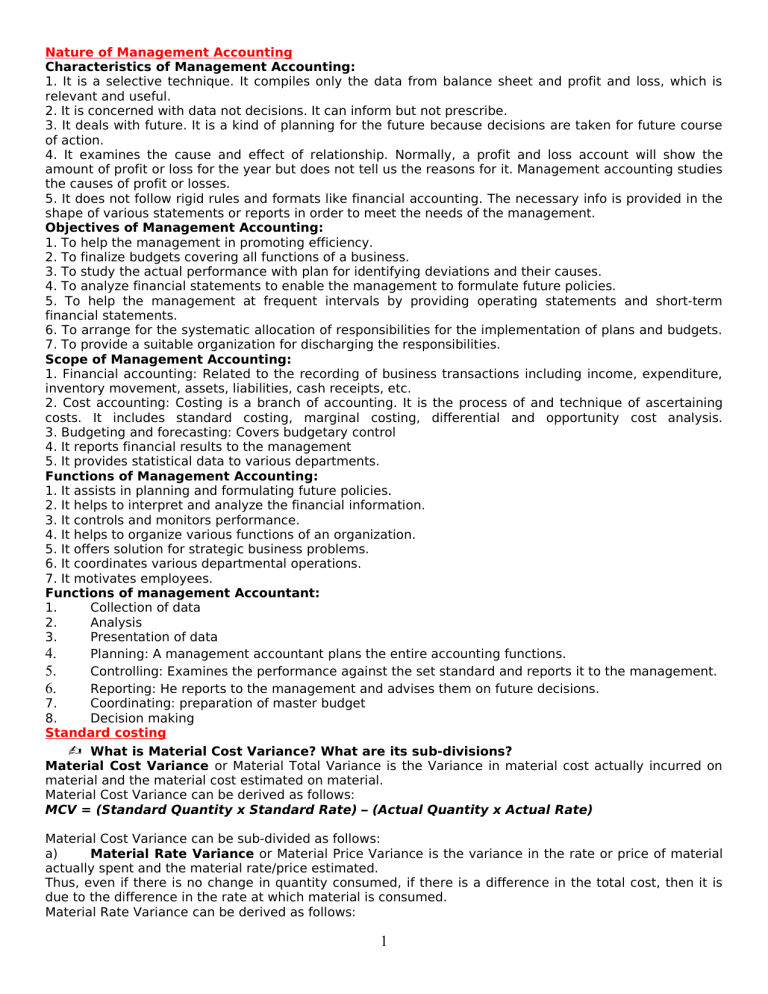Management accounting and decision making: Two case studies of outsourcing

Specific chapters relating to Managerial topics could be used as supplementary material in an Accounting II course. Could possibly be condensed but could be easily adapted to content coverage in the course. The text topics are presented in a logical fashion (but, as noted above, one can easily reorder several of the chapters to suit individual teaching needs). This text is very easily divided (or reordered) into modules to suit different teaching objectives. I teach several of the chapters “out of order” so that I bring in some concepts early in the semester. Examples used in the chapter text lend themselves to being used a guides when students work on assigned problems from the end every chapter.
Impact of AIS success on decision-making effectiveness among SMEs in less developed countries
AM has contributed substantially to the design of this study, review of literature, methodological approach, as well as in writing up the conclusions for this study. Management accountants may create inaccurate cost allocations that can over-cost the individual goods and services a company produces. Consumer products with artificially high production costs will lead to higher than average consumer prices and potentially lower sales. Management accounting can also create sales or production forecasting models that do not take into account current or future economic situations.

An Examination of Ethical Values of Management Accountants
Thus, if organisations strategically align SMA techniques usage to their operational setting, this would positively impact organisational performance. Within the goal of enhancing the literature on how to optimise the performance impact, much gaps still exist from the point off illuminating how differences in marketing and national culture differentiate SMA acceptance, usage, contingencies and performance impact. Thirty-three months on after Covid 19 was documented,Footnote 5 the pandemic is still ever present and has remained a daunting global challenge. Competing effectively in the dynamic marketplace is a major challenge for organisations, and with the Corona pandemic exerting unprecedent effects on organisations globally, most organisations are facing a more daunting challenge to survive (e.g. [65, 67]). Organisations must strive to strategically orientate their management accounting practices to enable them find ways to effectively navigate the daunting challenges they face in this Corona era.
Management Accounting for Climate-related Financial Disclosures
Adjustments or changes to financial constraints may require several months before the process creates useful constraints. Just like any other position, the salary of a management accountant depends on several factors including experience, specialties, education and designations, and the company for which you work. According to the IMA, the compensation for CMAs globally is 21% higher than that of non-CMAs. The group’s 2023 survey noted accountants with the CMA designation received a median salary of $137,137 in the Americas, with total compensation of over $163,000. Mulling also recommends getting involved in your profession at the local or global level.
- I would not be comfortable relying solely on this text for content – there is not enough contextualization nor enough visual aids for some of the material.
- But with these challenges come opportunities and solutions, so as finance and accounting teams jump into 2022, here’s what to prepare for and how to excel in 2022.
- In addition, realistic managerial scenarios present an issue that must be addressed by the management accountant.
- You’ll be recording and crunching numbers for internal review to help companies budget and perform better.
- I think this is an advantage of this text – most students dislike having to “wade through” a lot of dense writing to get to the point of the chapter or section.
I really like the introduction of each chapter, which starts with a business scenario in the form of dialogues that raises a particular management issue and then points out the necessity of learning the managerial accounting concepts covered in that chapter to solve such issue. Management accounting is an internal business function responsible for reporting financial information to business owners. Companies often use management accounting as a support tool for business management. Management accountants provide information relating to a company’s production operation. Although management accounting focuses on improving the company’s operations, a few problems can exist with this business function.
Outsourcing in Denmark—Across Four Industries: IT, Finance, Manufacturing, and Pharma/Biotech
For librarians and administrators, your personal account also provides access to institutional account management. Here you will find options to view and activate subscriptions, manage institutional settings and access options, access usage statistics, and more. Management accountants are best equipped to respond to the challenges expected in the coming year. The Big 4 accounting firm announced that it will invest $1 billion over three years in talent and technology. The investment includes a commitment to improve pay for early-career professionals.
This article teaches you about the profession of management accounting, touching on everything from a management accountant’s job responsibilities, skill set, and formal educational requirements right down to the professional designations that can help you get ahead. Accurate and relevant accounts are crucial to management accounting and shrewd decision-making by company leaders. If the accounting statements are inadequate, inaccurate, or incomplete, management may struggle to make appropriate choices when mapping out a company’s long-term strategy. For managerial accounting, weekly and monthly budgets govern the types of products sold, product inventory levels, and the price points needed to ensure that businesses maintain sufficient margins to cover costs and remain solvent. Furthermore, capital budgets outline potential future expenses, such as acquisitions, new equipment purchases, facility upgrades, and long-term project investments. All public companies domiciled in the United States must abide by generally accepted accounting principles (GAAP), which are a set of accounting formats that help investors compare and contrast the metrics of different organizations.
All four of the management accountants interviewed say that the minimum requirement for becoming a management accountant is a bachelor’s degree. Knese says a good undergraduate education is important to develop the critical thinking skills you need in the field. A management accountant may also identify trends and opportunities for improvement, analyze and manage risk, arrange the funding and financing of operations, and monitor and enforce compliance. They might also create and maintain a company’s financial system and supervise its bookkeepers and data processors. Management accountants may also have an area of expertise, such as taxes or budgeting.
In this discourse, it is underlined that effectively driving competitive advantage requires cost analysis that explicitly considers strategic issues. In line with that viewpoint, Cadez and Guilding [8] note that strategic costing involves “the use of cost data based on strategic and marketing information to develop and identify superior strategies that will produce a sustainable competitive advantage” (p. 27). Management accountants often supervise lower-level accountants who handle basic accounting tasks, such as recording income and expenses and tracking tax liabilities. This information is used to prepare income statements, cash flow statements, and balance sheets, In smaller firms, you may end up performing these tasks yourself. A management accountant performs analysis to forecast, budget, and measure performance and plans, then presents them to senior management to assist in operational decision-making. In a performance perspective that considers the ISO 9000 Quality Management System (QMS) aspect, Sedevich-Fons [77] examined the connection between strategic management accounting and quality management systems performance.
Objectives are included in the text at the beginning of a section, but they are all numbered “1” and are not summarized anywhere. There is no glossary or index included, which would assist greatly with quick referencing of the information. self billing of tax invoices However, the table of contents presents a comprehensive detailed overview of the book’s chapters and related sections. The material coverage is as complete as the book I currently use, though presented in a slightly different order.
